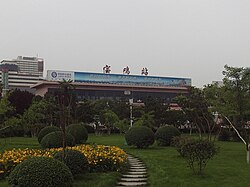Baoji
|
Baoji 宝鸡市 |
|
|---|---|
| Prefecture-level city | |

Baoji
|
|
 Location of Baoji Prefecture within Shaanxi |
|
| Country | People's Republic of China |
| Province | Shaanxi |
| Founded | 2000BC |
| Area | |
| • Total | 18,712 km2 (7,225 sq mi) |
| Elevation | 570 m (1,870 ft) |
| Population (2010) | |
| • Total | 3,716,731 |
| • Density | 200/km2 (510/sq mi) |
| Time zone | China Standard (UTC+8) |
| Postal code | 721000 |
| Area code(s) | (+86) 0917 |
| License Plate Prefix | 陕C |
| Website | www |
![]() Baoji (simplified Chinese: 宝鸡; traditional Chinese: 寶雞; pinyin: Bǎojī) is a prefecture-level city in western Shaanxi province, People's Republic of China.
Baoji (simplified Chinese: 宝鸡; traditional Chinese: 寶雞; pinyin: Bǎojī) is a prefecture-level city in western Shaanxi province, People's Republic of China.
The prefecture-level city of Baoji has a population of 3,716,731 according to the 2010 Chinese census, inhabiting an area of 18,172 km2 (7,016 sq mi). The city itself has a population of approximately 800,000. Surrounded on three sides by hills, Baoji is in a valley opening out to the east. Its location is strategic, controlling a pass on the Qin Mountains between the Wei River valley and the Jialing River. Passing through Baoji is the ancient Northern Silk Road, the northernmost route of about 2,600 kilometres (1,616 miles) in length, which connected the ancient Chinese capital of Xi'an to the West over the Wushao Ling Mountain to Wuwei and emerging in Kashgar before linking to ancient Parthia.
Thriving early in the Tang dynasty, it has roots to 2000 BC, but is now a large industrial center. Railways first reached Baoji in 1937 and have been key to its modern growth. Baoji is also considered the gateway between western and eastern China since most trains from Beijing, Shanghai and Xi'an pass through here on their way to Gansu, Sichuan, Xinjiang and Tibet (Lhasa). Fa Men Si (Famen temple), home to one of Buddha's finger bones, is also located in Baoji County. The Baoji area was home to the legendary Yandi, one of the Han Chinese forefathers. His tomb is located in the southern part of the city and his temple is located in the North.
...
Wikipedia
